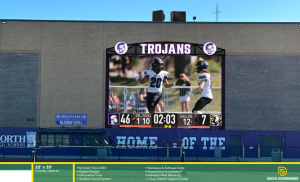Anonymous Alert system fuels drama with students
October 29, 2018
The number of Anonymous Alerts and false alerts submitted has risen this year. The police and administration have enforcements in place to discourage students from using alerts as a tool to hurt others.
D99 added the Anonymous Alert system, by Message Logix, in fall 2017, to help students and community members feel more comfortable reporting incidents that they deem a threat to school or personal safety. Last year, DGN spent $2,298 on the Anonymous Alerts system. Principal Janice Schwarze believes the system is worth the cost.
“I’m a firm believer in Anonymous Alerts. If it makes kids worried enough that they’re not going to bring [vaping materials] to school then we’ve had a victory. And if we can save one student’s life, or get them the help that they need, then it’s worth it,” Schwarze said.
As of Oct. 10, 48 Anonymous Alerts have been submitted, compared to the 89 total alerts from last school year.
“This year, we were more intentional about teaching it and mentioning it to people, especially after Parkland. That’s the kind of tip you’re hoping for– if somebody says that someone was talking about guns,” Schwarze said.
Anonymous Alerts, once submitted, serve as a fulfillment of reasonable suspicion, or the minimum requirement for students to be investigated by counselors, deans, or the school resource officers. Officer John Lyerly is one of the people responsible for investigating.
“We have to treat every Anonymous Alert seriously. That student has to come down, we have to talk to them, we have to do everything we can to talk to that student about it. Even if they don’t talk to us, we still have the right to search the student, their belongings, and their lockers. If you refuse to let me search you, that’s where we start to get into obstructing an investigation, which you can get a police consequence for,” Lyerly said.
Aside from interviews, DGN can use other methods to get information. Law teacher Karen Spahr-Thomas said that supplemental information to the alert, such as interviews with other students, also affects how a case is investigated.
“The administration can check outside public information that’s online, or any relevant documentation from police, call down people involved like friends, and, if those people give up their passwords and let the administration see accounts, they’re allowed to do that,” Spahr-Thomas said.
Nevertheless, the administration urges students to continue sending true alerts, as false alerts disturb the sanctity of the school environment and require time and effort to investigate.
“We have the capability of subpoenaing IP addresses, we can find out, on the police side, who did that anonymous alert. They can face police consequences,” Lyerly said.
Junior Lexi Dorion knows people who have been called down, only to be proven innocent.
“I feel like the purpose of Anonymous Alerts should be to report incidents that are a threat to the school’s environment or mental health concerns or bullying,” Dorion said. “Instead, I think there are students abusing the Anonymous Alerts system to get other students they dislike in trouble.”
Want to know more about Anonymous Alerts? Check out Ellie Cawthorne’s article about how Anonymous Alerts were used in Snowball sabotage.

























